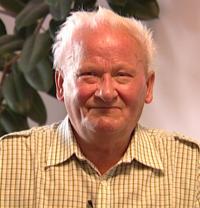“Just like fascism, also communism should disappear from the entire world. People should live like people.”

Stáhnout obrázek
Emil Lábus was born on April 23, 1932 in Spišská Belá. His father, who was a bricklayer, was a German by birth and his mother came from Slovakia. The family inherited a small homestead from his mother‘s father. When he was only eighteen years old, the State Security arrested him for the distribution of leaflets encouraging people not to vote the Communist Party. He was tried together with another fifteen defendants and four of them were supposed to be sentenced to death. Emil was finally sentenced to five years of imprisonment for the high treason and they sent him to the forced labour camp in Jáchymov. He had a work injury in the camp, so he got to the prison hospital where he met a doctor of Jewish origin, Professor Koch. He was released from the prison in 1956. When Emil Lábus was in custody and later in prison, he had to face cruel interrogation and battering, though he was only a young boy at that time. He still has painful memories of this period of life.
